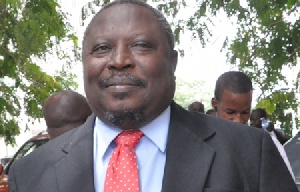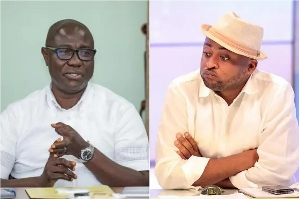K. Badu
Let us extol Mr Martin Amidu, the former Attorney General, in the late Mills administration, for his patriotism, vigilantism and unparalleled intrepidity.
As a matter of fact, Mr Amidu has evidenced his patriotic qualities over the years through his actions. That is, he has shown beyond conscionable doubt of his affection, solicitude and strong predilection towards his beloved Ghana.
If we go down memory lane, Mr Amidu was relieved of his duties by the late Mills for rightly exposing the gargantuan corruptions in the NDC government.
Mr Amidu, however, pledged wholeheartedly to retrieve all the undeserving monies that had been doled out to people and organisations like Wayome, Waterville and Isofoton.
Despite his unfortunate dismissal from his high profile position by the late Mills, Mr Amidu did not buckle under enormous pressure. He somehow persisted, and single handedly pursued the case in the Supreme Court of Ghana.
Ironically, however, it was revealed in the Supreme Court in 2014 that Mr Wayome was undeservingly paid a judgement debt in an excess of GH51 Million by his conspiratorial plotters.
As JSC Dotse aptly put it, ‘it was create loot and share’. In other words, Wayome’s judgement debt payment was a conspiratorial plot to dupe the nation. The Supreme Court thus ordered Mr Wayome to cough all the money in full.
Contrary to our expectations, however, the Attorney General, who has the sole responsibility as Ghana’s debt collector, showed lackadaisical approach in retrieving the money from Wayome.
It has been two years since the Supreme Court directed Mr Wayome to pay the money back into the coffers of Ghana. Nevertheless, Ghana’s sole debt collector, the Attorney General, has not shown any seriousness in taking the money from Wayome.
Consequently, the citizen vigilante, Mr Amidu, headed back to the Supreme Court with a view to assisting the laid-back Attorney General to retrieve the money back from Wayome. Subsequently, Mr Amidu filed with the Supreme Court with a view to interrogating Mr Wayome about his assets and how he expended our gargantuan GH51.2 million.
The citizen vigilante anticipates that by doing this, it will help to ascertain the whereabouts of Wayome’s assets and thereby facilitating the retrieval of the money. However, the Attorney General puzzlingly filed with the Supreme Court to discontinue the case.
Nevertheless, the Attorney General’s weird action did not dissuade Mr Amidu from proceeding to the Supreme Court for hearing. The Court however set the hearing date to Wednesday 16th November 2016.
To the delight of Mr Amidu and the well-meaning Ghanaians, the Court agreed that Mr Amidu can question Mr Wayome on 24th November 2016.
Truly, it is because of courageous and reflective thinkers like Mr Amidu that I do not want to assent to President Obama’s assertion that Africa needs strong institutions, not strong men.
For me, Obama’s observation is sophistic. Yes, Africa needs strong institutions, but then again, Africa needs ‘strong men’ like Mr Amidu to fortify the redundant institutions. Indeed, without courageous and strong men like Amidu, Africa cannot build strong institutions.
In fact, if you were to find out from me who is a serious corruption crusader between President Mahama and Mr Amidu, I will dare state that it is rather the latter. Absolutely, Mr Amidu has honourably upheld the relevant provisions of the United Nations 2005 Convention against Corruption.
Apparently, all that we keep hearing from President Mahama in his attempt to fighting corruption is ‘the paradox of exposure’. For in so far as detection is recognised in the fight against corruption, it is not an isolated tool in combating the menace of corruption; it goes hand in hand with prevention and deterrence.
Besides, the prevention and eradication of corruption is a responsibility of all and sundry, and with a view to cooperating with one another with the support and involvement of groups outside the government such as civil society, non-governmental organisations and community-based organisations.
If, indeed, the prevention and eradication of corruption is a synergistic venture, why is it then that President Mahama and his Attorney General are not willing to cooperate with Mr Amidu to retrieve the money from Wayome?
Corruption is indeed a global phenomenon and it therefore requires a collaborative effort to prevent and eradicate. It is against that background that in its resolution 55/61 of 4 December 2000, the UN General Assembly recognized that an effective international legal instrument against corruption, independent of the United Nations Convention against Transnational Organized Crime (resolution 55/25, annex I) was desirable and decided to establish an ad hoc committee for the negotiation of such an instrument in Vienna at the headquarters of the United Nations Office on Drugs and Crime.
Subsequently, the international community adopted the UN Convention against Corruption in 2003 and it came into force in 2005.
The UN Convention against Corruption is the first meaningful universal instrument enacted to prevent and combat corruption with a view to networking and building on a broad international consensus.
More importantly, Ghana signed the UN Convention against Corruption on 9th December 2004 and ratified on 27th June 2007.
In the great scheme of things, the Corruption Convention requires States to take measures to ensuring that public services are subject to safeguards that promote transparency, efficiency and merit-based recruitment. More so public servants should be subject to codes of conduct, financial disclosures and disciplinary measures.
Furthermore, the UN Convention against Corruption requires public officials to make declarations to appropriate authorities regarding, inter alia, their outside activities, employment, investments, assets and substantial gifts or benefits from which a conflict of interest may result with respect to their functions as public officials.
So, the all-important question we should ask President Mahama is: why did you receive a clandestine gift of a Ford Expedition Vehicle from a Burkinabe Contractor without informing your employers-Ghanaians?
What’s more, the Corruption Convention stresses that transparency and accountability in public finance must be promoted, and specific anti-corruption requirements, especially in the judiciary and in public procurement, must be established.
Apparently, former President Kufuor transposed one of the most relevant provisions of the UN Convention against Corruption -the procurement clause into our national laws.
Nevertheless, the crucial question the discerning Ghanaians should ask is: has President Mahama been able to fulfil Ghana’s obligations under the UN Convention against Corruption following the ratification?
Regrettably, however, Ghana’s ratification of the UN Convention against Corruption has not helped in our fight against the existential corruption under President Mahama and his NDC government.
Take, for instance, in recent years, President Mahama and his NDC government have been under the radar for numerous bribery and corruption allegations, inter alia, ‘the furtive gift (the Ford Expedition)by the Burkinabe Contractor Djabril Kanazoe; the Embraer 190 scandal; Armajaro; SADA; GYEEDA; SUBA Info Solutions scandal’ and many others.
Unfortunately, President Mahama and his NDC apparatchiks are bent on embezzling Ghana’s resources to the detriment of the poor. How bizarre?
Apparently, President Mahama and his NDC government corrupt practices have resulted in excessive public spending, less efficient tax system , needless high public deficit and destabilization of national budgets, heightened capital flight and the creation of perverse incentives that stimulate income-seeking rather than productive activities (‘create, loot and share’-apologies to JSC Dotse).
Opinions of Friday, 18 November 2016
Columnist: Badu, K















